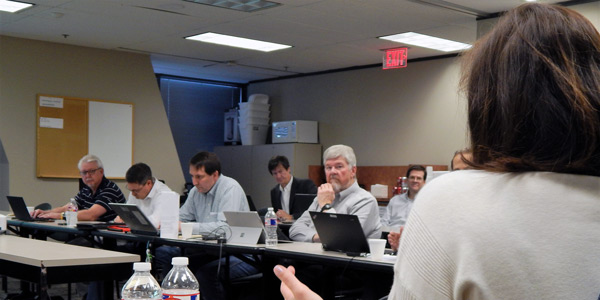By Tom Kleckner
DALLAS — SPP’s Z2 Task Force does not appear close to a solution for replacing its bedeviling crediting system for transmission upgrades.
After SPP staff and stakeholders presented alternative proposals Wednesday to improve the process in which members are assigned financial credits and obligations for sponsored upgrades, the only consensus was that more time is needed. Eight years of applying the credits incorrectly has complicated the task of trying to properly compensate project sponsors and claw back money from members that owe debts for the upgrades.
“I don’t think there’s a single proposal that addresses everything in the way we want to,” said Kansas City Power and Light’s Denise Buffington, the task force’s chair. “I think we’re going to have to cherry-pick what’s important. Concepts are important, and knowing what concepts would be nonstarters for you would be helpful.
“We don’t have the option of doing nothing,” she said, reminding the task force of its charge from the Board of Directors.
Sunflower Electric Power’s Davis Rooney suggested developing a matrix of the proposals’ elements to gain a better understanding of which pieces will be kept and which will be discarded.
“Are we retaining or not retaining the safe-harbor limit? The wind rule … the highway/byway” transmission-cost allocation rule? he asked. “Some of those questions seem pretty common across the proposals.”
“This has to be a package for us,” countered The Wind Coalition’s Steve Gaw. “Seeping little elements out, agreeing to take this out and that out … that will create a challenge. The idea that you have a set funding stream on capacity upgrades and you will get reimbursed over time … that might have some attractiveness to it.”
Some stakeholders expressed a preference for using transmission congestion rights (TCRs) or incremental long-term TCRs, while others suggested following a staff proposal to create a new schedule under the SPP Tariff. Staff is already digging through FERC orders to see how the RTO might justify Tariff changes, and it is soliciting input from MISO and PJM on how they allocate the cost of upgrades.
Meena Thomas, a senior market economist with the Public Utility Commission of Texas, said the state regulators’ Cost Allocation Working Group would be unlikely to accept any increase in base-plan funding as part of any rule change.
“Based on discussions at the CAWG, they have a concern,” Thomas said.
Staff Proposes New Schedule

Staff proposed replacing the Tariff’s Attachment Z2 with a separate Schedule 13. SPP’s Charles Locke said the new schedule’s charges would fund all upgrade sponsors’ credit payments and would apply to all network and point-to-point customers.
“A separate schedule might be cleaner and less complex in both administration and Tariff structure,” Locke said.
He said the charge could either be a regionwide charge or a combination of regionwide and zonal charges. The rate would be revised periodically, he said, possibly through an annual formula update.
Under the Schedule 13 proposal, Locke said, the entire facility cost would not be “simply” rolled into rates, instead being limited by the extent to which the facility is used for transmission service. He said the proposal would address legacy Z2 balances and eliminate directly assigned upgrade costs in the future.
Barraged by questions about his proposal, Locke injected some levity into the discussion. “Just to clear things up, I’m going to throw some calculations on the board,” he said to laughter.
The staff proposal had its supporters. “I’d like to see where Schedule 13 goes,” said the Kansas Power Pool’s Larry Holloway. “[I’d like to know] how material are the dollars that fly around and some idea of how big it is.”
AEP: Eliminate Invoicing

American Electric Power’s Richard Ross proposed an approach he said was “fair, reasonable and efficient.” He focused on sponsored network upgrades, saying the current approach has been to view the projects as “new construction,” but that they should be viewed as economic projects.
Ross suggested continuing to calculate revenue credits for long-term service and regionally funding the costs while eliminating the short-term revenue credit calculations and grossing up other credits by 2%. He said existing sponsorships should be handled the same way.
“The process would eliminate the invoicing and stop the proliferation of new project sponsors and their associated accounting,” Ross said.
Dennis Reed, a recent Westar Energy retiree and now a consultant with his Midwest Regulatory Consulting firm, had his own ideas. He proposed eliminating short-term TSR credits to reduce the number of new upgrade sponsors but leaving the rest of the TSR-upgrade process the same.
Reed suggested creating a 20-year payback schedule for only those generation interconnection (GI) upgrades that create available transfer capability (ATC) and giving ILTCRs for sponsored upgrades, which must still meet the current need test.
“The basic goal is to minimize the work staff has to do,” said Reed, alluding to the processing of short-term service requests, which account for about 2% of all Z2 work.
Reed said his proposal would reduce the number of future upgrade sponsors and give GI customers a guaranteed payment schedule for all upgrades that provide added ATC. It would also lower costs to transmission customers because most upgrades that do not increase ATC — generally for switches and enhanced control systems — are not eligible for payments, he said.
“A builder of a sponsored upgrade will know the possible value of any upgrade it builds,” Reed said.






